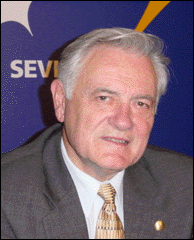
|
 TOP INTERVIEWS TOP INTERVIEWS |
 |
Interview with
HIS EXCELLENCY VALDAS ADAMKUS
ex-President of the Republic of Lithuania
Seville European Council 22nd of June, 2002
 |
What are your conclusions after the Seville Summit?
Firstly, I welcome the resolve of the EU member states to conclude by the end of this year the accession negotiations with Lithuania and the other nine candidate countries. Secondly, the European Union member states at Seville have presented a very clear and constructive position on how they envisage the European Union in the future. This position is a steadfast continuation and finalisation of the decision that had been taken at the Copenhagen European Council. We are optimists and believe that the process started in Copenhagen will be completed there in December this year.
Looking at Copenhagen, could you give us a timetable for Lithuania's accession with an optimistic and a pessimistic scenario?
As regards Lithuania, we are determined to step upo our efforts and maintain the dynamism achieved as we are approaching the finish line. We are definitely going to close the negotiations. Also, we shall respect all our commitments to the European Union. I believe that at the end of the year, when invitations will be extended finally to the candidate countries, Lithuania will be fully ready for assuming responsibilities of the EU membership.
How would you qualify the current investment climate in Lithuania?
One of the indicators that characterizes well any economy is an international rating of the country. At the beginning of 2002, the Standards & Poor has promoted Lithuania to BBB, which places it along with Latvia just after Estonia and Poland. Lithuania has been also demonstrating a stable GDP growth, which in 2001 was 5.9%, placing Lithuania in the second best position after Latvia among the candidate countries. The annual inflation rate, which now stands at 1.3%, is the lowest in Central and Eastern Europe and is well below that of the European Union, which currently is 2.5%. Exports grew by 20% in 2001.
All of these indicators speak about stability and growth of Lithuania's national economy, which is necessary for attracting investors. Furthermore, our largest investors have been expanding their business in Lithuania and this is the best encouragement for all investors who are looking for environment favourable to their operation.
Lithuania's accession to the European Union has brought to light the difficult situation with regards to Kaliningrad's citizens. How will Lithuania maintain the balance between the EU's demands and Russia's position concerning free movement of its citizens?
First of all, we hope that in preparing the study on the free movement of persons to and from Kaliningrad within the framework of the Schengen acquis, the Commission will consult Lithuania and will take into account the results for negotiation concerning Lithuania's accession to the Schengen Agreement. On the other hand, Lithuania is ready for initiatives leading to the solution of this issue. Today, just a few minutes before our interview, I had a conversation with Commission' President Romano Prodi who said that Lithuania, being not only close to Kaliningrad in geographical terms, but also having an in-depth knowledge of the problem, should submit realistic proposals on how to find a durable solution. Lithuania's position is that Brussels and Moscow have to agree, at the highest level, on certain principles. Lithuania and Poland will duly execute any agreement reached by them. At the same time, Lithuania will effect all measures possible under the Schengen acquis to facilitate the travel for the people of Kaliningrad between Kaliningrad and mainland Russia.
Note: WINNE cannot be held responsible for the content of unedited transcriptions. |
|
| | | | |
| |
|

